Illustrations
It’s been a while, so here are some more samples of my work…



Latest Works
Here are a few of the latest photographs, paintings, and digital art I have created.
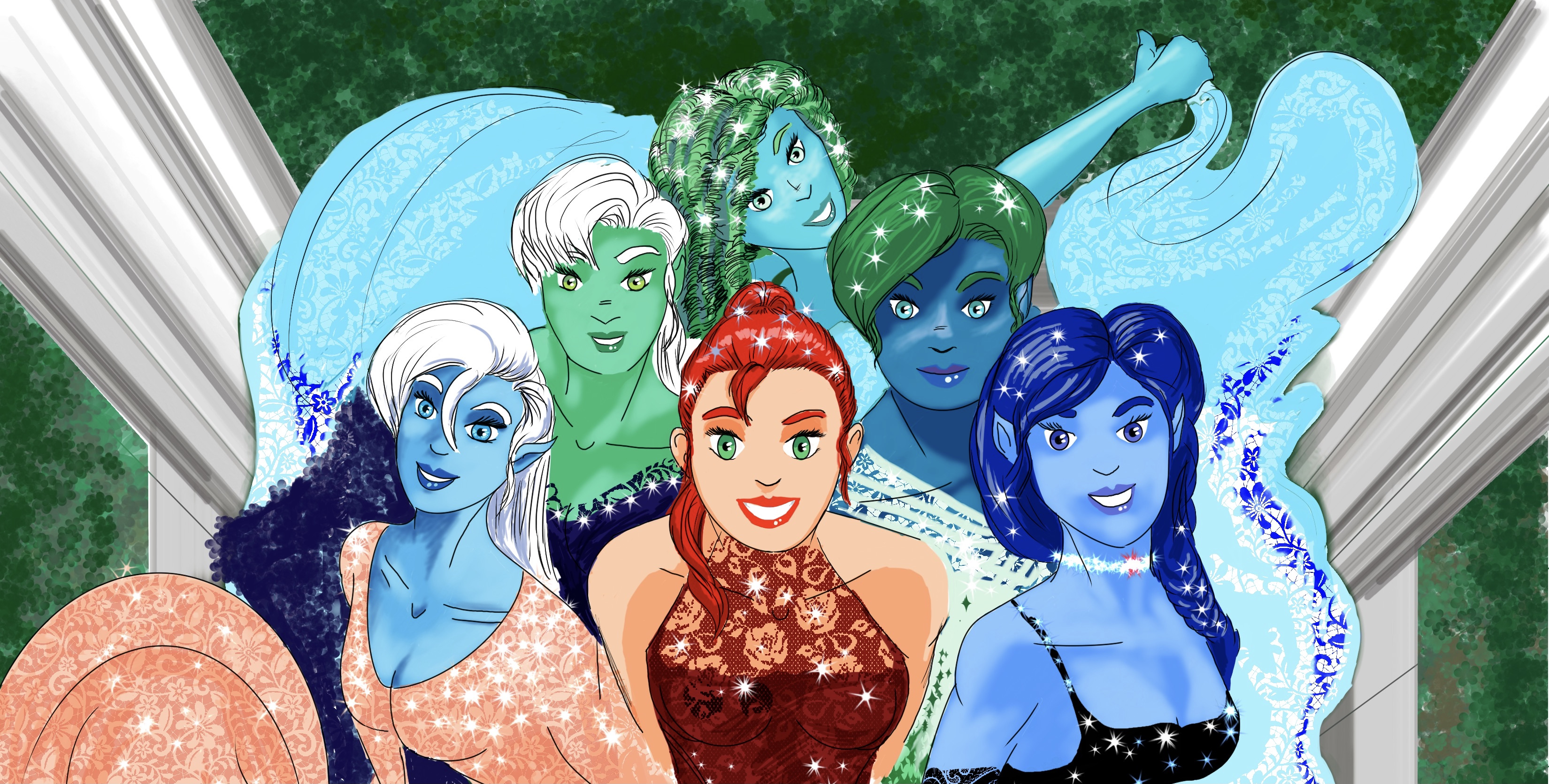





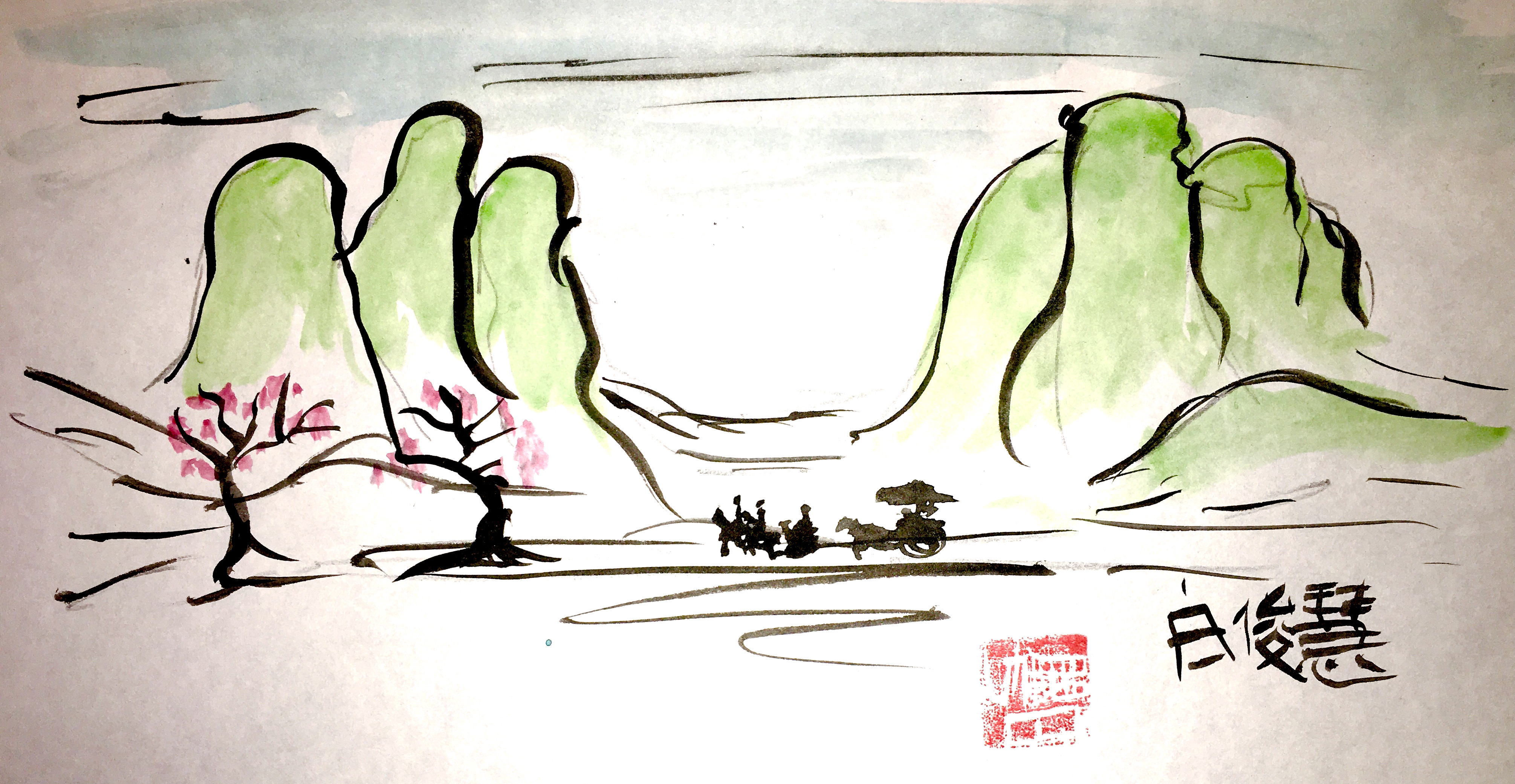
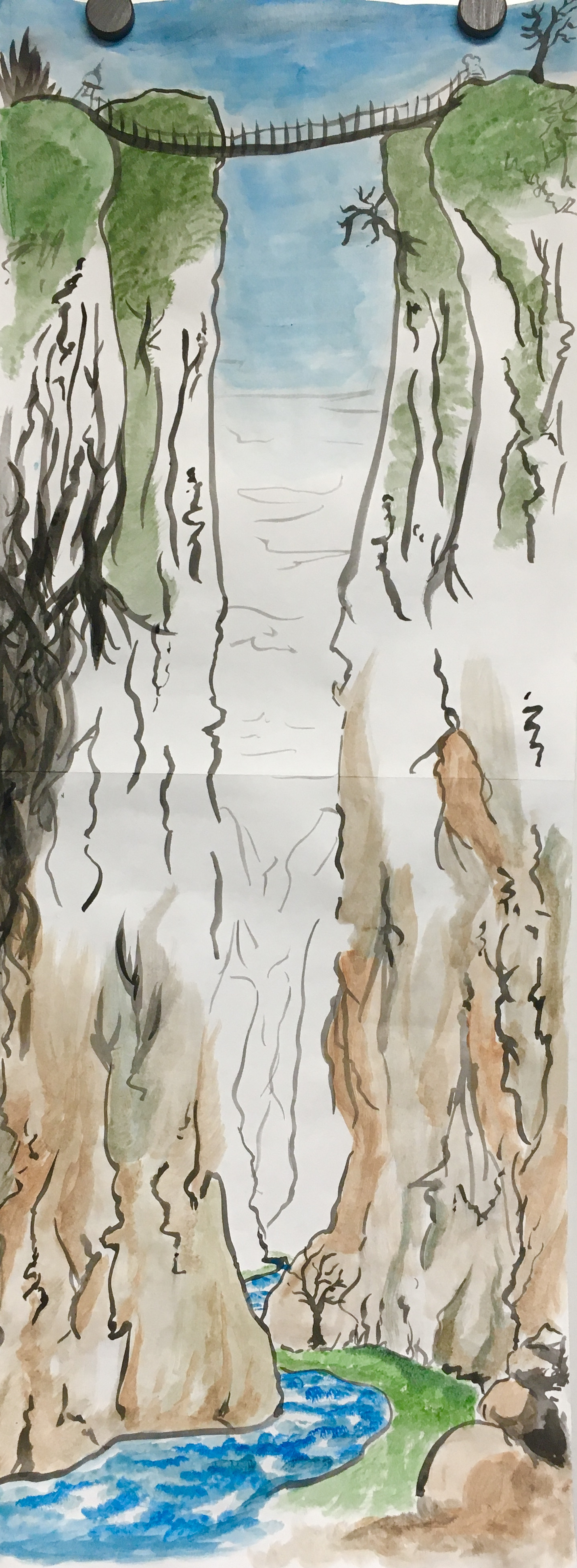




Recent Images


The Arrogance of Modern Civilization
As I’ve watched several programs on TV, and read articles about archeological finds, I find myself shaking my head at the conclusions some of these so-called researchers come to. They seem to be incapable of giving credit where credit is due. There is an assumption that if someone lived before our great age of enlightenment, then they were incapable advanced thought or engineering.
Let’s look at one example of great knowledge and engineering being lost. The Hellenization of the Mediterranean led to a great accumulation of knowledge from the surrounding areas. With Greek being the lingua franca of the region, the writings of Euclid, Aristotle, Hippocrates, and others were widely available, so knowledge of medicine, geometry, and astronomy were easily accessed by anyone looking for knowledge. Great cities were built, with running water (hot and cold in some houses) and sanitary sewers, multistory apartment buildings, and the use of concrete for construction. The Roman Empire thrived because of this knowledge.

This knowledge remained in the Eastern Empire, called the Byzantine by the West, but was lost completely by Western Europe. A once educated people became illiterate peasants. Even the nobility had little knowledge of anything beyond what they could see. But that was not true of the whole world. The Greek texts still existed and were used in the Eastern Mediterranean to create great buildings, practice medicine, and keep the water running. The spread of Islam brought this same knowledge back to the West, and the city of Granada became the intellectual capital of the Mediterranean, with running water, sewers, and gas lighting in the city streets.
As Wester Europeans took to the seas in the 15th centuries, they “discovered” new lands, and in those lands they found buildings beyond their imagination. Pyramids built on the same scale as the ones in Egypt, roadways and buildings using concrete and mortar, and stones cut to such precision that even experts today can’t explain how the locals made them. This leads many to use the old copout that “…aliens must have done it.” After all, humans before us must have been stupid, so there’s no way they could have done something we can’t explain.
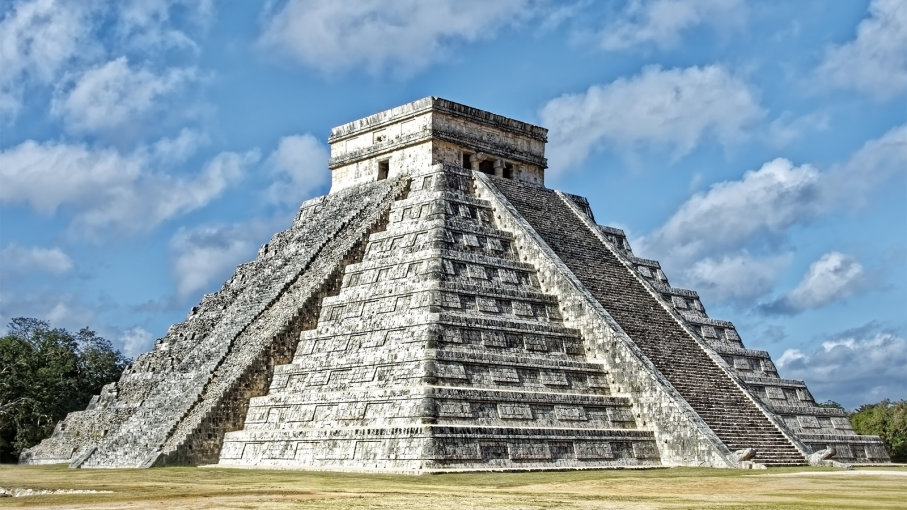
It seems that we get caught up in the now and think that the past was all in black and white, and our predecessors knew nothing. This is an extremely adolescent attitude. Mark Twain is credited with saying:
“When I was a boy of fourteen, my father was so ignorant I could hardly stand to have the old man around. But when I got to be twenty-one, I was astonished at how much he had learned in seven years.”
Collectively we act like the fourteen-year-old when it comes to the people of the past, rather than acting more maturely by giving our ancestors some credit. They were humans of intelligence just like us; there is abundant evidence of that, but we are shocked when we see something that we can’t explain. Human ingenuity is not a new trait, and I’m sure this will be borne out as we make new discoveries of old things that were lost.
Holey Plots and the Big Boss
You may not know this, but I love looking for plot holes in movies. Many of them are very benign and can easily be excused, since a screenwriter can’t think of every possible scenario. Some of them are glaring and obvious, but the whole movie is so terrible that you’ll do anything to make it stop, so deep thought about the movie is a waste of time. Then there are those wonderful treasures, the plot holes that hide in plain sight in what often is a high-quality movie.
For example, in Star Trek VI: The Undiscovered Country, the mysterious presence of equipment to “measure gaseous anomalies” on the U.S.S. Enterprise, despite the fact that it was aboard the U.S.S. Excelsior at the beginning of the movie, and the two vessels were never anywhere near each other until the penultimate scene, when Uhura reminds the captain about the aforementioned equipment. It enabled them to destroy the cloaked Klingon Bird of Prey with a specially modified torpedo, and the Enterprise emerged victorious. Despite that, it was still a great movie and one of the best Star Trek films.
I have been batting around a certain notion for a few years, and after some in depth analysis, I have come to a conclusion:
Yoda is the real villain of the Star Wars saga.
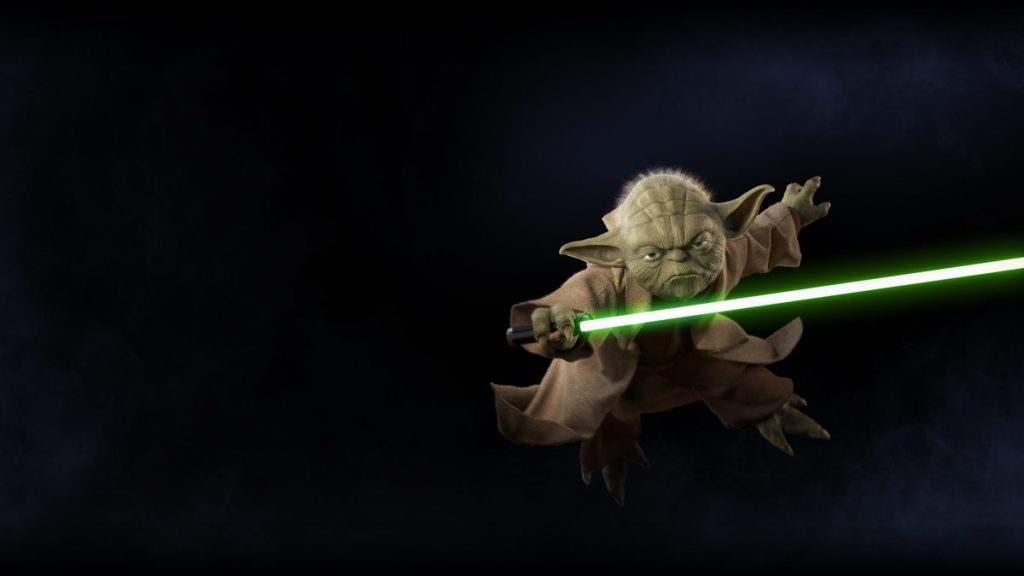
Yes, you read that right.
Yoda. Big Bad Guy.
The Capo, the Schemer, the Architect of everything wrong with the world. You’re probably saying: “This guy has flipped his lid.” And while the jury is still out on that, let me illustrate how, when viewed through the lens of Yoda Corleone, the Republic was his to toy with, and in the end, his big scheme to take control blew up in his face.
Now before you counter with other arguments, this argument is based solely on what is in the movies, not the animated series, not books, short stories, fan fiction, or other sources. That being said, consider the following points:
Point One—Yoda the Liar. Yoda misled Obi-Wan when it came to the existence of Kamino and the clone army. Obi-Wan learns that someone has doctored the Jedi archives, and when he says so to the archivist, she protests that it can’t be possible. If that’s the case, only someone of a high station, like someone on the Jedi Council, would have the kind of permissions needed to cull information from the archives.

Point Two—Yoda, the Richest Jedi in Babylon. How could a mysterious Jedi Master named Sifo-Dyas pay the trillions of credits necessary to create a clone army and no one in the Jedi Council notices? The answer is simple—Yoda covered it up. Either that or he is so inept that he couldn’t read an accounting report on Jedi holdings. Or perhaps there is a third possibility that the Jedi have so much money and property that the payment for a clone army was barely a drop in their financial bucket and could easily be chalked up to a clerical error. Whatever the reason, the Jedi paid a load of money to create an army of clones who would be loyal to them and the Republic.
Point Three—Yoda, George Patton. When the clone army is brought to the robot planet Geonosis, Yoda is not surprised at all at the appearance of a huge clone army, along with all their hardware, and then wastes no time in taking command of the army himself. Seriously. He doesn’t even blink, and the clones are all programmed to respond to his orders without question. How could he not be aware of that? Never mind the final scene in Episode II: Attack of the Clones, where he and some other bigwigs watch the clones loading up on to Star Destroyers and head out to war, and no one questions where the army or ships came from. He must have had them all under his little green thumb.
Point Four—Yoda the Blind Monk. He stood right next to a Dark Lord of the Sith and didn’t notice anything wrong. For a Jedi Master who said “My ally is the Force, and a powerful ally it is…” he seemed woefully out of touch with the force when at the end of Episode I: The Phantom Menace, he stands right next to Palpatine, the Sith boss himself, and doesn’t even get a tingle? We can therefore conclude that he knew who Palpatine really was and let him continue because he served a useful purpose.
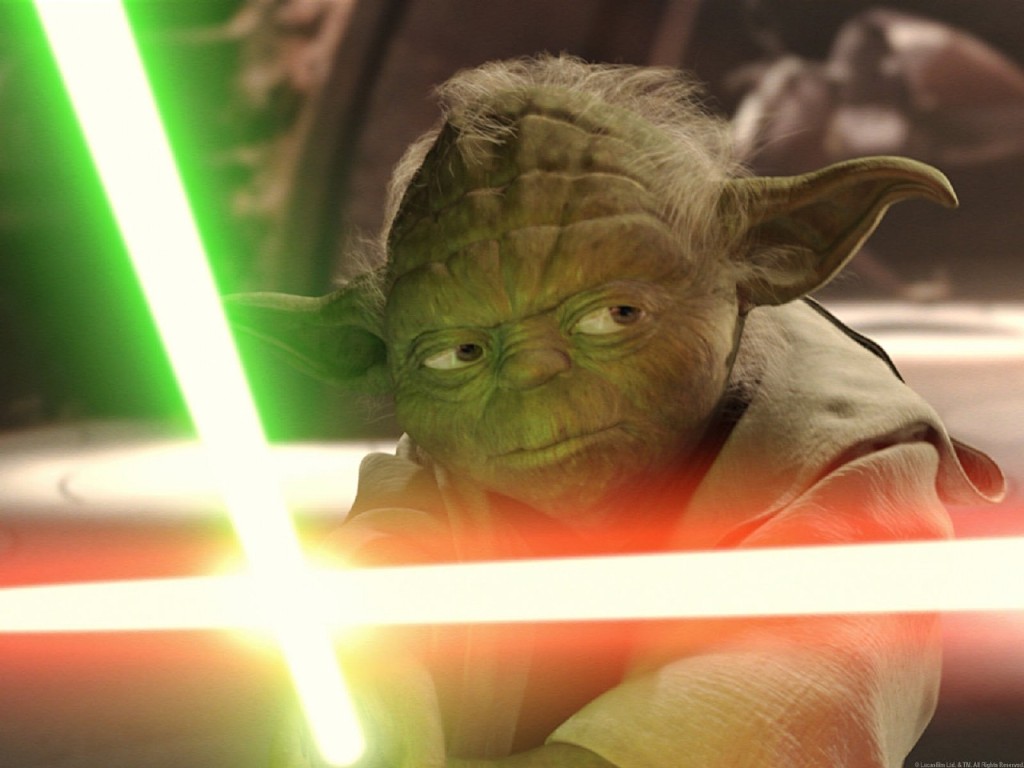
Point Five—Kung Fu Yoda? For all his talk of peace and detachment from the physical and emotional, he threw it all to the wind when he went all Speedy Gonzales on Count Dookie. Yoda always preached against violence, but he dropped all semblance of dignity or decorum when he bounced around like a superball in a ridiculous and not-purposely-comical light saber duel.
Point Six—Runaway Yoda. Instead of facing the consequences of his failure, he goes into “exile.” Again, for all his talk of being righteous and responsible, when he sees the Republic going down, he runs away to Degobah. If that doesn’t sound like a South American dictator running off to another country with all the money, then I don’t know what would. He doesn’t do what a samurai would do—commit seppuku—and instead acts like a common criminal and high tails it as far as he can go and hides on a swamp planet with absolutely no one else living there.
Point Seven—Boss Yoda. The Jedi had the biggest, nicest, most expensive building on Coruscant. The Jedi are swimming in cash, as I said in point two. The Jedi had obviously given up the pretense of being ascetics and lived in luxury like the warlords the really were. Sure, they still preach to their trainees that the simple life is the way but practiced very little of that themselves. And it seemed that no one even questioned it.
Point Eight—Yoda the Shogun. The Jedi were the Republic’s equivalent of the Samurai, and Yoda would be the Shogun, the de facto leader of the Republic. No one questioned the actions of the Jedi, and they had the authority to arrest, disarm (literally), or kill anyone in their way. Sounds exactly like the Samurai in 17th century Feudal Japan; they answered only to their own social order and direct superiors, and the people of the Republic go along with it. When Anakin and Obi-Wan catch a would-be assassin, Anakin tells the curious onlookers: “Jedi business, move along.”

Point Nine—Yoda, Fingers in Every Pie. When the Trade Federation blockades Naboo, instead of sending in an actual negotiator or diplomat, he sends in the Jedi to resolve the issue. That would be the equivalent of the President of the United States sending in the Navy SEALS to deal with a trade dispute between two small islands in the South Pacific. This demonstrates that Yoda had no real interest in preserving the peace. In fact, very much the opposite; sending in the Jedi only served to stoke the fires of war. This simple act is one of the most obvious tells that Yoda is willing to have his followers do whatever it takes to retain power.
All of this does not excuse the entire Jedi order—they had been abducting children and raising them as warriors for “a thousand generations”, and kept the Republic in check, effectively ruling the Republic with their mystical ways. But the excoriation of the Jedi can wait for another day; the fish fry of the day is Yoda, the head of the Jedi Crime Syndicate.
Endgame: I Was Underwhelmed
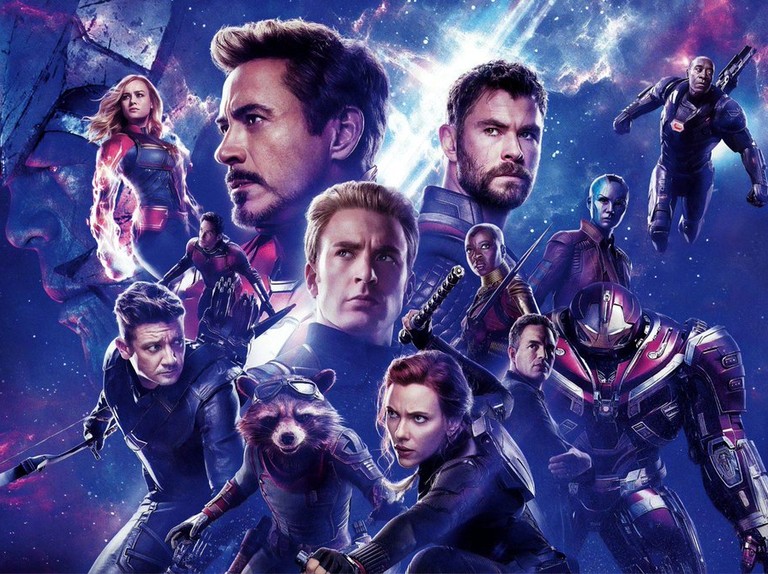
Endgame: Why It Underwhelmed Me.
I understand that what I am about to say will more than likely result in outrage on the part of some of you readers (yeah, all three of you), but it needs to be said:
Avengers: Endgame was a disappointment.
Yes, you read that right.
Disappointing.
So much so that I have yet to buy a digital or physical copy of it; by contrast I had Alita: Battle Angel on the day it became available. I have had several months to mull it over, and my original impressions still stand. I left the theatre feeling let down and I couldn’t put my finger on it, but then it came to me: it was too simple. It lacked the depth of Avengers: Infinity War, where the characters were giving it their all to stop Thanos with no possibility of knowing the outcome, where as in Endgame it felt, well, canned.
So Thanos destroys the Infinity Stones, and much like Cortez burning his ships, forces the rest of the characters to either go along or find another way out (exactly how he was able to do that is a different story altogether.) This seemed like a cheap way to change the rules of the game established in Infinity War, much the way the Wachowski brothers tried to change the rules at the end of Matrix Reloaded, and that soured me forever on all but the original Matrix.
Time Travel? Really?
So in going with the time travel option, Endgame quickly became a heist movie, which had already been done in brilliant fashion in the MCU with Ant Man, so Endgame became Ocean’s Twelve to the much better Ocean’s Eleven. Yes, I know that time travel is a staple of Sci-fi and comic books, but I expected a much more elegant solution to the mess set up at the end of Infinity War than to simply hit the reset button, which is what the time travel option did: they brought everyone back, eliminated Thanos, and lived happily ever after. Well, most of them did. Tony’s death was sad, and he was the most developed character in the MCU, having had the most screen time and opportunities to complete a character arc.
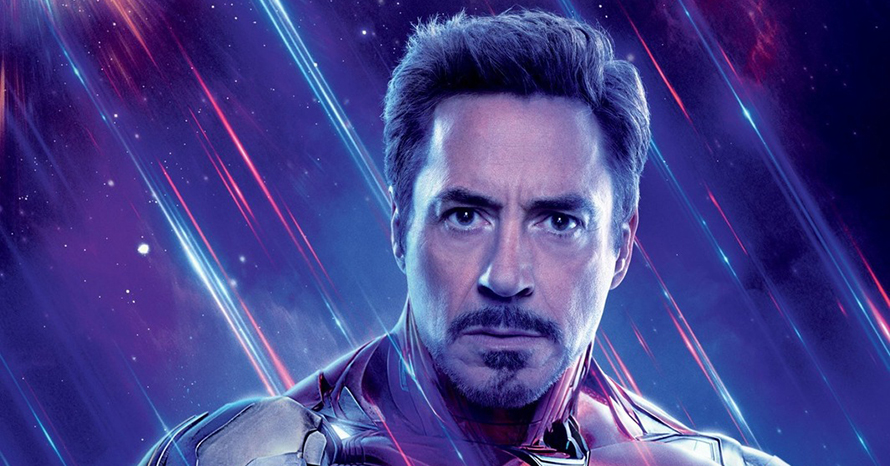
Deus Ex Machina
I know that the same people wrote both movies, but the Endgame just did not feel as though the stakes were really all that high. Everyone knew that the good guys would win, and that at least one beloved character would die in the process. This is what happened in the comic book version of Civil War—in the end Captain America paid the ultimate price for his beliefs, and in keeping with the character of Steve Rogers. Endgame delivered that, but it felt, well, too easy. I never felt like there was even a remote possibility of failure.
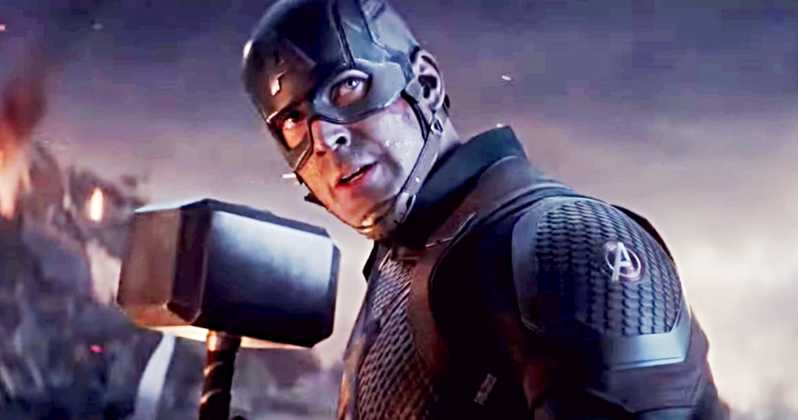
Exploring the Soul Stone
We got a good look at the Tesseract/Space stone in Captain America: The First Avenger and The Avengers, the Reality stone in Thor: The Dark World, the Power stone in Guardians of the Galaxy, the Mind stone in Avengers: Age of Ultron, and the Time stone in Doctor Strange. Then the Soul stone was introduced in Infinity War, and unfortunately that’s as far as it went. There was no exploration of the stone, no explanation of how or why it worked, and Endgame would have been the perfect vehicle for that. There was that scene with Thanos speaking with a young Gamora, which, judging by the color of the sky, ostensibly took place inside the Soul stone. I would have loved to have seen the Russo brothers plumb the depths of the Soul stone and its powers and possibilities, much the way the Time stone was in Doctor Strange, but alas, it was not to be. They teased us with the possibility, but pulled what felt like a bait-and-switch and took the easy way out.
Hwimleian

Eathelyn

Of Epona and Eamon
The tale of Epona and Eamon is on this wise:
Epona, the fairest and wisest daughter of Argona
Chosen among her sisters to be the Great Lady
Upon the death of Argona, Mighty Queen
And defender of the Blessed Realm
High praise was hers from both men and faerie
For she treated both with fairness and equity
She sought not war or offence
Her name blessed by many for the peace
Wrought under her mighty and gentle hand
Eamon, mighty among men and kings
Son of Drest, son of Máedóc, son of Mochán
From his cradle heard tales of the great Epona
And the alliance she forged with mortals
Whished to look upon her with his own eyes
Though he listened to songs of her beauty
He would not believe that she could be still
For many years had passed among men
And he thought that beauty surely had withered
As vines in the bitter frost of autumn
Or the ungathered fruits under driven snows
Doubtless she must be a ganrled crone, said he
For no person can retain youth so long a time
I shall not beleive reports or tales or rumors
But must see her as she is this day
With a haughty air and little faith
Did he approach the gates of Tre war Venydh
Why didst thou come hither, o man of Exe
Asked the sentinels who guarded the gates
Said he: I am come to see thy queen, the great Epona
And judge for myself if she has beauty yet
The sentinels forbad his entry into Afallach
Thou faithless man, said they
Wherewith didst thou doubt the queen
Should not her beauty be until her passing?
I shall not believe, said he, I am king of Caerwysg
And I would pass these gates and see the queen
Said they, thy title means nothing, o mortal
But we shall inquire if the queen would
Allow an audience with such a man
Unworthy of praise and song as thou art
Wait and watch here until we bring word
I shall await your queen’s invitation, said Eamon
The sun set and the dews wet the grasses
Yet no word came from Afallach
Eamon tarried near the gates
His cloke drawn about him aginst the cold
The sky awoke in the East, and birds sang
Heralding a new day and still no tidings
‘Twas when the sun was at zenith word came
The queen’s messenger came to the gates
And called unto Eamon, saying: O, man
The queen has heard thy overweening speech
And marvels at thine audiacity and foolhardiness
Yet she has judged notwithstanding thy mean
Baseborn sires and barbarous provenance
Thou shall be allowed to behold her beauty
But only after thou completest three tasks
Eamon bowed low and said: Say to your queen
That Eamon is not without merit or skill
And will with joy take on whatever tests
She chooses to inflict upon my being
I shall not fail, therefore I would ask in return
That I be allowed into her presence
That I may deem for myself if her beauty is
Without equal in the realms of man and fair folk
The messenger said: Thou shalt be held to this
Touch, therefore, this stone in token of treaty
And thou shalt be bound to this oath and doom
Eamon arose and placing his hand on the stone
Utter’d: My fate shall be bound to this geas
And ruin come upon me should I break fealty
The messenger said: it is well what thou doest
The queen shall be pleased to hear your promise
Here then is the first task given you
Go to the South sea and cast thy net therein
Thrice shall thou do this reaping only fish
But on the fourth, great treasure shall ye find
Bring it to the westermost end of this land
Safeguard it until the queen’s herald arrives




